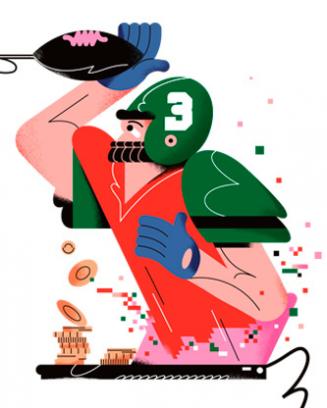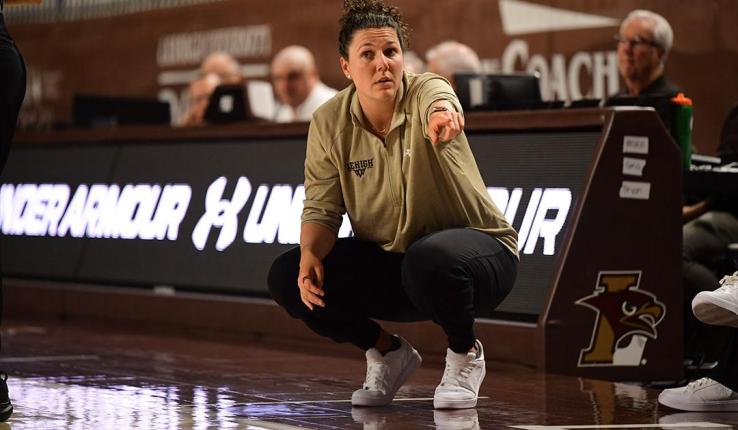Daily Fantasy Sports: Games of Skill or Gambling
Like most Americans, Lehigh business law professor Matthew Melone couldn’t help but notice the avalanche of DraftKings.com and FanDuel.com TV ads whenever he would watch an NFL game.
“Their TV commercials were inescapable,” said Melone, a self-professed sports fan. “And while sports and gambling have been around in various forms for years, this was different because the sports leagues themselves were investing in, not fighting against, these daily fantasy companies in an effort to get more eyes on their sport.”
The approach has worked.
Over the past few years, there has been an explosion in the popularity of daily fantasy sports in North America. Industry studies indicate there are an estimated 57 million daily fantasy players across the United States and Canada. And thanks to some hefty investments from top sports franchises, and even sports media outlets like ESPN, daily fantasy industry leaders FanDuel and DraftKings have been valued at over $1 billion each. As daily fantasy sports have grown in popularity, so have the number of state attorneys general questioning whether the contests run afoul of state gambling laws.
The rapid growth of the industry and the growing number of states challenging daily fantasy’s legality piqued Melone’s interest.
He started researching the history of fantasy sports, which he says began in the 1950s with fantasy golf, and today’s legal challenges to daily fantasy sports. The results of his research, titled Fantasy Sports Contests: Does the Fun Justify the Fantasy that these Contests are not Gambling?, will be published in the University of Virginia Sports & Entertainment Law Journal.
Melone takes no position on whether states should allow these contests. Instead, he takes the position that states should be transparent, treat these activities as gambling, and then make a reasoned policy choice as to whether the entertainment and economic value of these contests justify the attendant social costs.
As for the federal government, Melone says, “I believe the federal government should stay out of this fight and let the individual states decide.”
Daily fantasy sports is a new development, an offshoot of the much older season-long fantasy sports contests. The advent and growth of daily contests is attributable to both technological developments—for example, cloud-based technology on mobile phones—and the ingenuity of industry participants who recognized the appeal of the immediacy of daily contests in contrast to the delayed gratification of season-long contests.
FanDuel and DraftKings let people use an app to pick a fantasy team on a Sunday morning for a one-day league. By Sunday night, you know if you won. Similar one-day leagues are offered for almost every major sport. This quick-and-easy sports fantasy game for money is luring millions of new players each year. FanDuel’s revenue was $14 million in 2013, $57 million in 2014 and over $100 million in 2015.
The growth of daily fantasy sports has not gone unnoticed by legal authorities. Attorneys general in a number of states, including New York, Illinois, Texas, and Massachusetts have begun to question the legality of these daily fantasy games. Although state gambling laws vary and very few directly address fantasy sports, a majority of state gambling laws apply a “predominately chance” test to determine whether an activity constitutes gambling. State authorities have asserted that daily fantasy sports contests are predominately games of chance and have drawn a distinction between daily and season-long contests by not challenging the legality of season-long contests.
Fantasy sports industry executives assert that daily fantasy games are predominately skill-based. Moreover, they further posit that a fantasy sports carve out in a 2006 federal law, the Unlawful Internet Gambling Enforcement Act, supports their position. That law, aimed at preventing payment processors such as credit card companies from funding online gambling activities, contains a specific exemption for fantasy sports contests that meet certain standards.
Melone believes that the focus on the skill-chance dichotomy is misplaced. In addition to the practical difficulties in determining whether success is predominately due to skill or chance, this focus is not helpful when it comes to fantasy sports. Skill-based activities are favored because they provide incentives to acquire skills that society purportedly values. Moreover, skill tends to be a barrier for unskilled players, thereby providing some protection from abuse. However, even if one concedes that some socially desirable skills are implicated in fantasy sports—such as the ability to manage a budget and parse data—these skills can be acquired easily in more benign pursuits.
Fantasy sports contests are risk-creating activities and should, therefore, be deemed a form of gambling, Melone said. Supporters of fantasy sports often argue that financial market activities implicate similar issues as fantasy sports. That analogy is misguided, he said. The vast majority of financial market activities shift existing risks among different parties but do not create risk. Admittedly, he said, some financial market transactions do create risk—two-sided speculation with derivatives, for example. After 2008, there should be very little doubt of the damage that may be done by financial market excesses. However, Melone said, if one agrees that certain financial transactions are socially undesirable, that merely points to the need for greater regulation of financial markets and not to the allowance of fantasy sports. The fact that society tolerates one harmful activity is not a reason to tolerate another, he said.
Melone used an example to illustrate the futility of the skill-chance test. Mastery of calculus is a skill-based pursuit. Imagine the uproar if a professor at the university established a system whereby students could wager significant sums of money against each other based on exam results. Is there any doubt such wagers are gambling despite the fact that what is being wagered upon is a skill-based activity?
An open question is whether states can authorize fantasy sports. The Professional and Amateur Sports Protection Act, a 1992 federal law which prohibits states from authoring sports betting except for grandfathered activities in certain states (such as Nevada), may hamper states. (The law prevented New Jersey Gov. Chris Christie from instituting sports betting at New Jersey casinos.)
It is not clear whether fantasy sports are covered under this law, and it has never been tested. The law was passed well before daily fantasy sports contests came into being and its purpose was to prevent “fixing” of games. Fantasy sports offer little possibility in this respect. Melone believes the law should not prevent states from authorizing fantasy sports.
While the “Is daily fantasy sports a game of skill or gambling?” debate will rage on, Melone firmly believes it is gambling, but that daily fantasy-sports sites will continue to flourish, racking up hundreds of millions of dollars in revenue.
“In the end, I believe that most states will allow daily sports fantasy to continue, but with age restrictions, wager limitations, and other safeguards to minimize abuse,” says Melone.
Story by Bill Doherty
Posted on:






